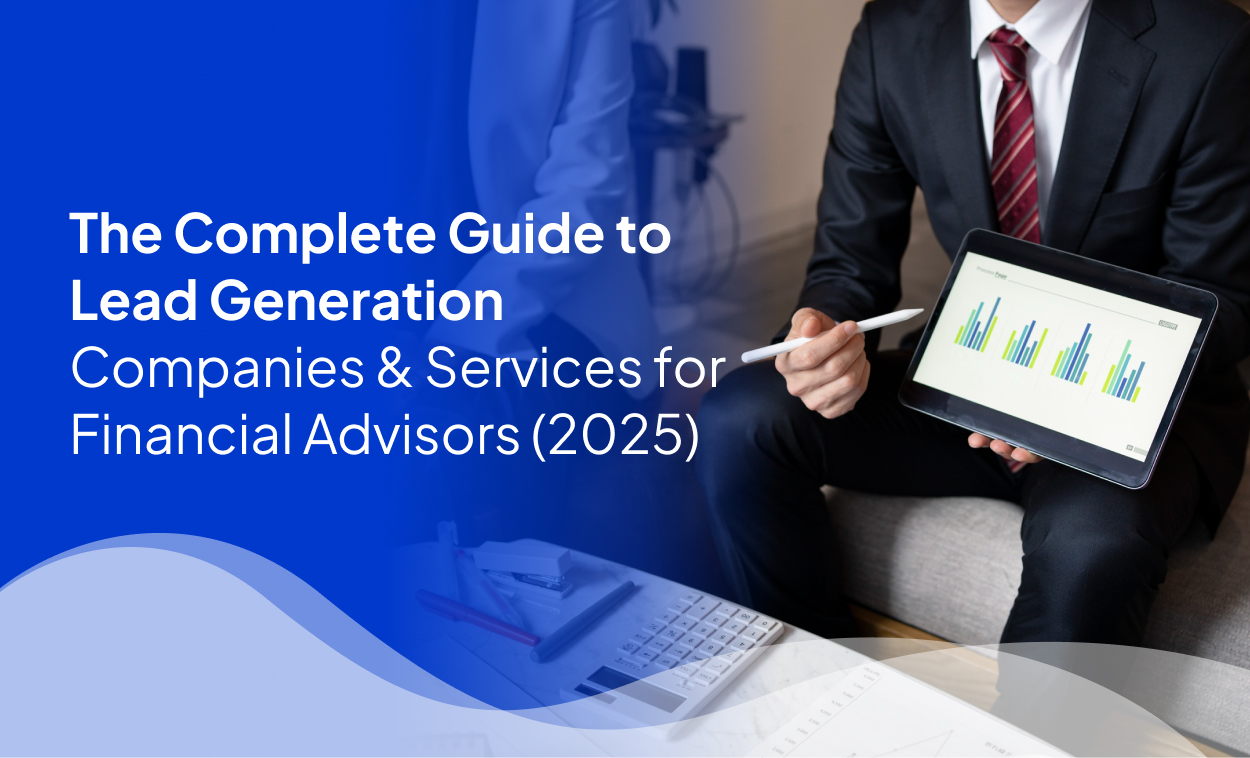
- Written & Reviewed by Jeremy
- Published
- Last Updated Sep 12, 2025
With clear, well-defined marketing strategies for financial advisors, firms, or individuals can not only attract their ideal clients but also build credibility, strengthen their reputation, and boost conversions.
1. Stories Beat Spreadsheets Every Time
Most advisors explain their process using charts, pie slices, and probability graphs. And yes, those belong in your meetings. But when it comes to financial advisor marketing strategies, they make eyes glaze over. What clients actually remember are stories.
For instance, you wrote a post about a client who almost missed their Social Security timing and how a simple tweak saved them thousands over their lifetime. Or you record a quick video about the teacher who thought she could never retire until you mapped out a plan that showed otherwise.
2. Stop Pleasing Everyone Own a Small Corner Instead
When someone from that group finds you, they will resonate better. That moment of recognition is pure marketing gold and one of the great marketing strategies for financial advisors.
Pick a micro-niche and create one downloadable resource just for them, like “The RSU Windfall Playbook” or “18-Month FERS Retirement Countdown.” You will be amazed at how much faster strangers start to feel like warm leads.
3. Compliance Doesn’t Have to Kill Your Marketing
Make sure whichever marketing strategy for financial advisors complies with the law and regulations.
Let’s be honest: most advisors treat compliance like a brake pedal. It slows down content, waters down creativity, and frustrates everyone involved.
But here’s the truth if you use it smartly, compliance actually makes your marketing stronger.
Build a personal “compliance toolkit.” Keep a folder of pre-approved language, sources, and green-light topics. Instead of starting from scratch every time, remix from your own library. You will publish faster, get fewer edits, and look twice as credible.
4. Don’t Just Automate Leads, Automate Loyalty

Retention is cheaper than acquisition, and loyalty automation builds trust between meetings, making it one of the deadliest marketing strategies for financial advisors.
Add one “surprise and delight” automation, like a quick message when a client’s kid turns 18 (“Here are 3 things to know about college savings this year”). These little touches go a long way.
5. Conversation-based SEO

When you think of SEO, you probably picture stuffing “retirement advisor near me” onto your website. That’s outdated. Modern search is about answering questions, the exact questions your clients type into Google.
For example:
“Should I max out my TSP before contributing to an IRA?”
“How are RSUs taxed when I change jobs?”
“When do RMDs actually start if I’m still working?”
Answer those in plain English, publish them as blog posts, and you will show up exactly when someone needs you most.
Use your client emails as inspiration. If two people asked you the same question this month, write a post about it. It’ll not only help SEO but also give you a library of resources you can send clients directly. seo for financial advisors is really helpful.
6. Build Tools That Collect First-Party Data
Think:
When someone uses a tool, they are telling you exactly where they are in their journey. That’s data you own.
7. Client Education Webinars & Live Q&A Sessions

Hosting webinars on topics like retirement planning, tax-saving investments, or building generational wealth helps you bridge that gap.
These sessions position you as a guide rather than just a seller, making prospects more likely to trust you with their money.
Adding a live Q&A at the end makes it interactive, allowing potential clients to voice their concerns in real time.
Not only do webinars generate leads, but they also build credibility because clients remember who took the time to educate them, not just sell to them.
9. Podcasting & Guest Speaking

Podcasts have become one of the most effective ways to reach busy professionals who prefer learning on the go as a kind of indirect marketing strategy for financial advisors.
Unlike ads or static blogs, podcasts create a sense of personal connection, as listeners feel like they’re having a one-on-one conversation with you.
Guest speaking also helps tap into new audiences by leveraging someone else’s community. Over time, this consistent visibility builds authority, trust, and a loyal listener base that naturally converts into potential clients.
Great marketing is not about doing more it’s about doing what matters most. At Revenx, we combine modern tools and timeless principles to help you stand out. From building a trustworthy financial advisor website design, to scaling reach with Facebook marketing for financial advisors, to driving instant traffic with PPC for financial advisors, we ensure your strategy is both creative and measurable. With the right system in place, your marketing won’t just attract attention it will bring in clients who stay for the long term.
Final Thoughts
If you want to grow, you need to lean into modern marketing strategies for financial advisors with content that educates, social media that builds trust, and campaigns that put you in front of the right clients. Don’t wait until your pipeline dries up to start.
FAQs
What is the 80/20 rule for financial advisors?
The 80/20 rule for financial advisors means that most of your results come from a small portion of your efforts. In practice, this means that a few key financial advisor marketing strategies will generate the majority of your new clients.
Instead of spreading yourself thin, focus on the marketing strategies for financial advisors that bring the best results, such as building strong referral networks, hosting client events, or publishing expert content that attracts the right audience.
What are the 3 C's of selecting a financial advisor?
The three C’s of selecting a financial advisor are character, competence, and communication. Clients want to know their advisor has strong ethics and integrity, the knowledge to manage wealth effectively, and the ability to explain financial decisions in a way that feels clear and trustworthy.
A strong marketing strategy for financial advisors should highlight these qualities so potential clients can easily see the value you bring.
How do I market myself as a financial advisor?
Marketing yourself as a financial advisor means showing people not just what you do, but why they should trust you. Use financial advisor marketing strategies like publishing insightful articles, hosting educational webinars, or building a strong presence on LinkedIn.
Pair this with authentic client stories and clear communication about your services. The right marketing strategy for financial advisors creates visibility, builds credibility, and helps you connect with the clients who need you most.
How to attract new clients as a financial advisor?
To attract new clients as a financial advisor, focus on building relationships rather than simply promoting services. Marketing strategies for financial advisors that work include creating content that answers real financial questions, offering free resources like webinars or guides, and maintaining a consistent presence where your audience spends time online.
The key is to position yourself as approachable, trustworthy, and knowledgeable so potential clients feel confident in reaching out.






